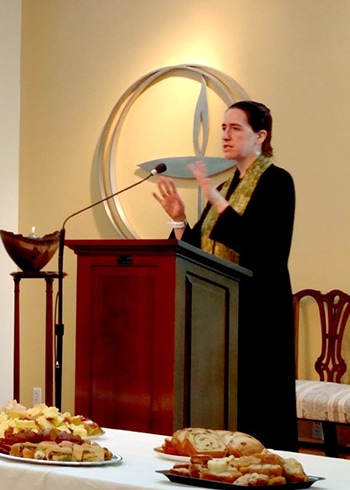Worship

Much like pastoral ministries, worship ministries have the capacity to transform our lives and the world by “re-membering” the interdependent web. In worship, we call to mind and heart our connections to the universe, to all living things, to each other, and to our faith. We reaffirm our membership in humanity, and recommit to the choices that support and uphold life. Worship reminds us that we are part of something larger than ourselves. Through shared spiritual practice, we find renewal and inspiration for living our values in the world.
Effective worship invites the presence of the sacred and, at least at times, the embodied presence of the whole community. A congregation that includes multigenerational worship in its calendar is better able to regard itself as a unified community with a continuous past, presence, and future. Worshipping together is radically inclusive and not necessarily easygoing at first, yet it is in the spiritual community where we learn how to practice acceptance and consideration, making the inherent worth and dignity of every person more than a theoretical statement.
As a minister, it is my practice to include children and youth in worship for at least part of the time each week, and for the entire length of the main Sunday worship service at least several times a year. I am open to emerging models such as the “second hour of church,” in which everyone worships together for a full-length service and everyone is invited to a religious education experience each week. Multigenerational worship is a skill that requires study and practice to do well, and I consider this one of my areas of special expertise.
Inclusivity in worship is not limited to age. I believe that our UU Principles ask us to give thought and effort to issues such as disability access; welcoming people across the identity spectrum; and using an anti-racist, anti-oppressive lens to make sure our worship is as liberating and moving as it can be.
Sunday morning worship is a touch point when the whole community can come together and understand itself as one body. Ideally, the community has special opportunities for worship at other times. I am experienced with contemplative vespers services, children’s worship, meditation, Pagan rituals, justice-oriented vigils, and interfaith celebrations, to name a few such opportunities. Programs such as covenant groups and sacred text study groups may also have an element of worship in them.
As the lead minister, I would expect that all of the congregation’s worship ministries be under my purview, including services and small group experiences at which I am not present. That being said, worship is necessarily a shared ministry. Quality worship thrives under a collaborative team approach, managed by clear leadership that brings together people with many gifts. I enjoy facilitating creative worship planning with staff and lay leaders when it comes to music, storytelling, worship technology, embodied spiritual practice, aesthetics, and other worship arts. Worship is where we practice wholeness, and I believe that cultivating worship teams is one of the disciplines of creating the beloved community.
Effective worship invites the presence of the sacred and, at least at times, the embodied presence of the whole community. A congregation that includes multigenerational worship in its calendar is better able to regard itself as a unified community with a continuous past, presence, and future. Worshipping together is radically inclusive and not necessarily easygoing at first, yet it is in the spiritual community where we learn how to practice acceptance and consideration, making the inherent worth and dignity of every person more than a theoretical statement.
As a minister, it is my practice to include children and youth in worship for at least part of the time each week, and for the entire length of the main Sunday worship service at least several times a year. I am open to emerging models such as the “second hour of church,” in which everyone worships together for a full-length service and everyone is invited to a religious education experience each week. Multigenerational worship is a skill that requires study and practice to do well, and I consider this one of my areas of special expertise.
Inclusivity in worship is not limited to age. I believe that our UU Principles ask us to give thought and effort to issues such as disability access; welcoming people across the identity spectrum; and using an anti-racist, anti-oppressive lens to make sure our worship is as liberating and moving as it can be.
Sunday morning worship is a touch point when the whole community can come together and understand itself as one body. Ideally, the community has special opportunities for worship at other times. I am experienced with contemplative vespers services, children’s worship, meditation, Pagan rituals, justice-oriented vigils, and interfaith celebrations, to name a few such opportunities. Programs such as covenant groups and sacred text study groups may also have an element of worship in them.
As the lead minister, I would expect that all of the congregation’s worship ministries be under my purview, including services and small group experiences at which I am not present. That being said, worship is necessarily a shared ministry. Quality worship thrives under a collaborative team approach, managed by clear leadership that brings together people with many gifts. I enjoy facilitating creative worship planning with staff and lay leaders when it comes to music, storytelling, worship technology, embodied spiritual practice, aesthetics, and other worship arts. Worship is where we practice wholeness, and I believe that cultivating worship teams is one of the disciplines of creating the beloved community.